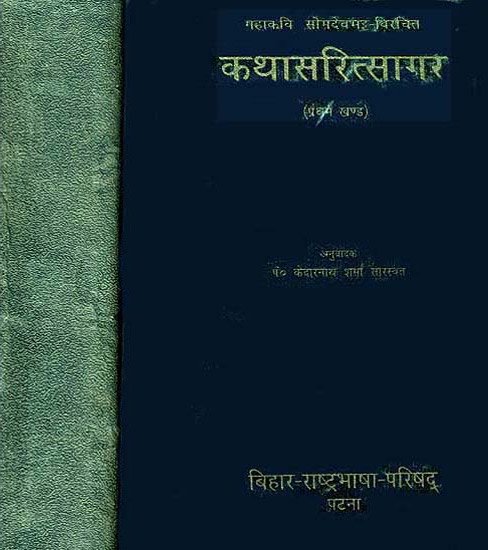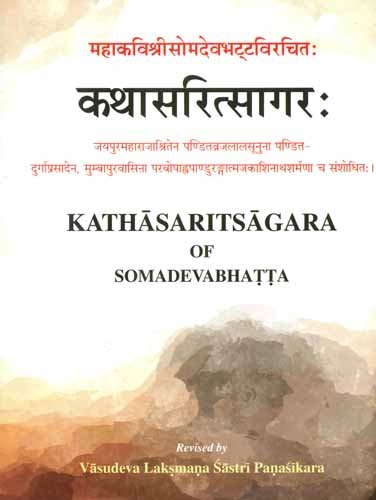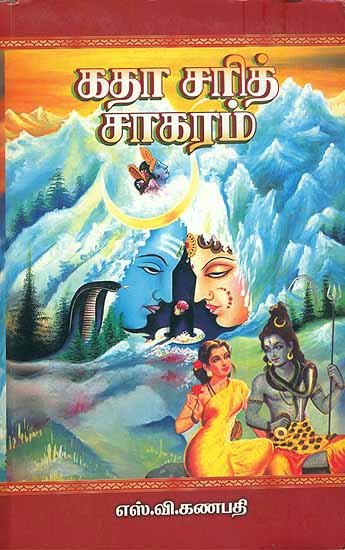Kathasaritsagara [sanskrit]
by C. H. Tawney | 2014 | 226,424 words | ISBN-13: 9789350501351
The Sanskrit edition of the Kathasaritsagara referencing the English translation and grammatical analysis. Written by Somadeva and dating from the 12th century, the Kathasaritsagara (or Katha-sarit-sagara) represents an epic legend narrating the adventures of Naravahanadatta as he strives to become the destined emperor of the Vidyadharas. Alternative titles: (Kathāsaritsāgara, कथासरित्सागर, Kathā-sarit-sāgara)
Verse 5.1.232
तच् छ्रुत्वा दृढनिश्चयां विगणयञ् जातिस्मरां तां सुतां नास्याश् चान्यम् अभीष्टभर्तृघटने पश्यन्न् उपायक्रमम् ।
देशे तत्र ततः प्रभृत्य् अनुदिनं प्रष्टुं नवागन्तुकान् भूयो भूमिपतिः स नित्यपटहप्रोद्घोषणाम् आदिशत् ॥ २३२ ॥
tac chrutvā dṛḍhaniścayāṃ vigaṇayañ jātismarāṃ tāṃ sutāṃ nāsyāś cānyam abhīṣṭabhartṛghaṭane paśyann upāyakramam |
deśe tatra tataḥ prabhṛty anudinaṃ praṣṭuṃ navāgantukān bhūyo bhūmipatiḥ sa nityapaṭahaprodghoṣaṇām ādiśat || 232 ||
The English translation of Kathasaritsagara Verse 5.1.232 is contained in the book The Ocean of Story by C.H. Tawney. This book is available online or you could buy the latest edition:
Read online Buy now! The English translation by C.H. Tawney (2014)
Glossary of Sanskrit terms
Note: This extracts Sanskrit terms and links to English definitions from the glossary, based on an experimental segmentation of verse (5.1.232). Some terms could be superfluous while some might not be mentioned. Click on the word to show English definitions.
Dridhanishcaya, Vigana, Yat, Yah, Jatismara, Sut, Suta, Nasya, Nasi, Abhishta, Ghatana, Pashyat, Upaya, Krama, Desha, Tatra, Tatah, Tad, Tata, Anudinam, Nava, Navan, Agantuka, Bhuyah, Bhuyas, Bhumipati, Nitya, Patahaprodghoshana,
Analysis of Sanskrit grammar
Note: this is an experimental feature and only shows the first possible analysis of the Sanskrit text (Kathasaritsagara Verse 5.1.232). If the system was successful in segmenting the sentence, you will see of which words it is made up of, generally consisting of Nouns, Pronouns, Verbs, Participles and Indeclinables. Click on the link to show all possible derivations of the word.
- Line 1: “tac chrutvā dṛḍhaniścayāṃ vigaṇayañ jātismarāṃ tāṃ sutāṃ nāsyāś cānyam abhīṣṭabhartṛghaṭane paśyann upāyakramam ”
- tac -
-
- Cannot analyse chrutvā*dṛ
- dṛḍhaniścayām -
-
dṛḍhaniścayā (noun, feminine)[accusative single]
- vigaṇa -
-
vigaṇa (noun, masculine)[compound], [vocative single]vigaṇa (noun, neuter)[compound], [vocative single]
- yañ -
-
yat (noun, masculine)[vocative single]√i -> yat (participle, masculine)[nominative single from √i class 2 verb], [vocative single from √i class 2 verb]yaḥ (pronoun, masculine)[accusative single]
- jātismarām -
-
jātismarā (noun, feminine)[accusative single]
- tām -
-
tā (noun, feminine)[accusative single]sā (noun, feminine)[accusative single]
- sutām -
-
sut (noun, masculine)[genitive plural]sut (noun, neuter)[genitive plural]sutā (noun, feminine)[accusative single]√su -> sutā (participle, feminine)[accusative single from √su class 5 verb]√sū -> sutā (participle, feminine)[accusative single from √sū class 6 verb]√sū -> sutā (participle, feminine)[accusative single from √sū class 2 verb]√su (verb class 2)[imperative active third dual], [imperative middle third single]
- nāsyāś -
-
√nās -> nāsya (participle, masculine)[nominative plural from √nās class 1 verb], [vocative plural from √nās class 1 verb]√nās -> nāsyā (participle, feminine)[nominative plural from √nās class 1 verb], [vocative plural from √nās class 1 verb], [accusative plural from √nās class 1 verb]√nas -> nāsya (participle, masculine)[nominative plural from √nas class 1 verb], [vocative plural from √nas class 1 verb]√nas -> nāsyā (participle, feminine)[nominative plural from √nas class 1 verb], [vocative plural from √nas class 1 verb], [accusative plural from √nas class 1 verb]nāsi (noun, feminine)[ablative single], [genitive single]nāsī (noun, feminine)[ablative single], [genitive single]
- cānya -
-
√cam -> cānya (absolutive)[absolutive from √cam]√cam -> cānya (absolutive)[absolutive from √cam]ca (noun, neuter)[nominative plural], [vocative plural], [accusative plural]
- am -
-
a (noun, masculine)[adverb], [accusative single]ā (noun, feminine)[adverb]e (noun, masculine)[accusative single]
- abhīṣṭa -
-
abhīṣṭa (noun, masculine)[compound], [vocative single]abhīṣṭa (noun, neuter)[compound], [vocative single]
- bhartṛ -
-
bhartṛ (noun, masculine)[compound], [adverb]
- ghaṭane -
-
ghaṭana (noun, neuter)[nominative dual], [vocative dual], [accusative dual], [locative single]ghaṭanā (noun, feminine)[nominative dual], [vocative single], [vocative dual], [accusative dual]
- paśyann -
-
paśyat (noun, masculine)[nominative single], [vocative single]
- upāya -
-
upāya (noun, masculine)[compound], [vocative single]
- kramam -
-
krama (noun, masculine)[adverb], [accusative single]
- Line 2: “deśe tatra tataḥ prabhṛty anudinaṃ praṣṭuṃ navāgantukān bhūyo bhūmipatiḥ sa nityapaṭahaprodghoṣaṇām ādiśat ”
- deśe -
-
deśa (noun, masculine)[locative single]deśā (noun, feminine)[nominative dual], [vocative single], [vocative dual], [accusative dual]
- tatra -
-
tatra (indeclinable adverb)[indeclinable adverb]tatra (indeclinable correlative)[indeclinable correlative]tatra (indeclinable)[indeclinable]
- tataḥ -
-
tataḥ (indeclinable adverb)[indeclinable adverb]tataḥ (indeclinable correlative)[indeclinable correlative]tataḥ (indeclinable)[indeclinable]tad (noun, neuter)[ablative single], [ablative dual], [ablative plural]tata (noun, masculine)[nominative single]√tan -> tata (participle, masculine)[nominative single from √tan class 8 verb]sa (noun, masculine)[ablative single], [ablative dual], [ablative plural]sā (noun, feminine)[ablative single], [ablative dual], [ablative plural]
- Cannot analyse prabhṛty*an
- anudinam -
-
anudinam (indeclinable)[indeclinable]
- praṣṭum -
-
√praś -> praṣṭum (infinitive)[infinitive from √praś]
- navā -
-
nava (noun, masculine)[compound], [vocative single]nava (noun, neuter)[compound], [vocative single]navan (noun, masculine)[compound], [nominative single]navan (noun, neuter)[compound], [adverb], [nominative single], [accusative single]navā (noun, feminine)[nominative single]nu (noun, masculine)[vocative single]√nu (verb class 1)[imperative active second single]
- āgantukān -
-
āgantuka (noun, masculine)[accusative plural]
- bhūyo* -
-
bhūyaḥ (indeclinable)[indeclinable]bhūyas (noun, masculine)[compound], [adverb]bhūyas (noun, neuter)[compound], [adverb], [nominative single], [vocative single], [accusative single]
- bhūmipatiḥ -
-
bhūmipati (noun, masculine)[nominative single]
- sa -
-
sa (noun, neuter)[compound], [vocative single]sa (noun, masculine)[nominative single]
- nitya -
-
nitya (indeclinable adverb)[indeclinable adverb]nitya (noun, masculine)[compound], [vocative single]nitya (noun, neuter)[compound], [vocative single]
- paṭahaprodghoṣaṇā -
-
paṭahaprodghoṣaṇa (noun, neuter)[compound], [vocative single]
- am -
-
a (noun, masculine)[adverb], [accusative single]ā (noun, feminine)[adverb]e (noun, masculine)[accusative single]
- ā -
-
a (noun, masculine)[compound], [vocative single]ā (noun, feminine)[nominative single]ṛ (noun, feminine)[nominative single]ṛ (noun, masculine)[nominative single]ā (Preverb)[Preverb]
- adiśat -
-
√diś (verb class 6)[imperfect active third single]
Other editions:
Also see the following editions of the Sanskrit text or (alternative) English translations of the Kathasaritsagara Verse 5.1.232
Kathasaritsagar
by Kedarnath Sharma Saraswat (2005)
The Only Edition with the Sanskrit Text and its Hindi Translation (An Old and Rare Book) Set of 3 Vol.
Buy now!
Kathasaritsagara of Somadeva Bhatta (Sanskrit Text Only)
by Vasudeva Laksmana Sastri (2013)
Katha Sarit Sagar in Marathi
by H. A Bhave (1995)
Set of 5 Volumes; Published by Varada Books, Pune. 2256 pages (Throughout B/W Illustrations).
Buy now!
Katha Sarit Sagara (Tamil)
by S. V. Ganapati (எஸ். வி. கணபதி) (2014)
[கதா சரித் சாகரம்] Published by Alliance Publications.
Buy now!
Galpa Shono
by Abhijit Chattopadhyay (2014)
[গল্প শোনো] Galpa Shono: Bengali Translation of 'Suno Kahani From Katha Sarit Sagar'; 9788126015436; Published by Sahitya Akademi, Delhi.
Buy now!Preview of verse 5.1.232 in Bengali sript:
তচ্ ছ্রুত্বা দৃঢনিশ্চযাং বিগণযঞ্ জাতিস্মরাং তাং সুতাং নাস্যাশ্ চান্যম্ অভীষ্টভর্তৃঘটনে পশ্যন্ন্ উপাযক্রমম্ ।
দেশে তত্র ততঃ প্রভৃত্য্ অনুদিনং প্রষ্টুং নবাগন্তুকান্ ভূযো ভূমিপতিঃ স নিত্যপটহপ্রোদ্ঘোষণাম্ আদিশত্ ॥ ২৩২ ॥
![Kathasaritsagara [sanskrit] - book cover](/uploads/a/Katha-Sarit-Sagara.jpg)




